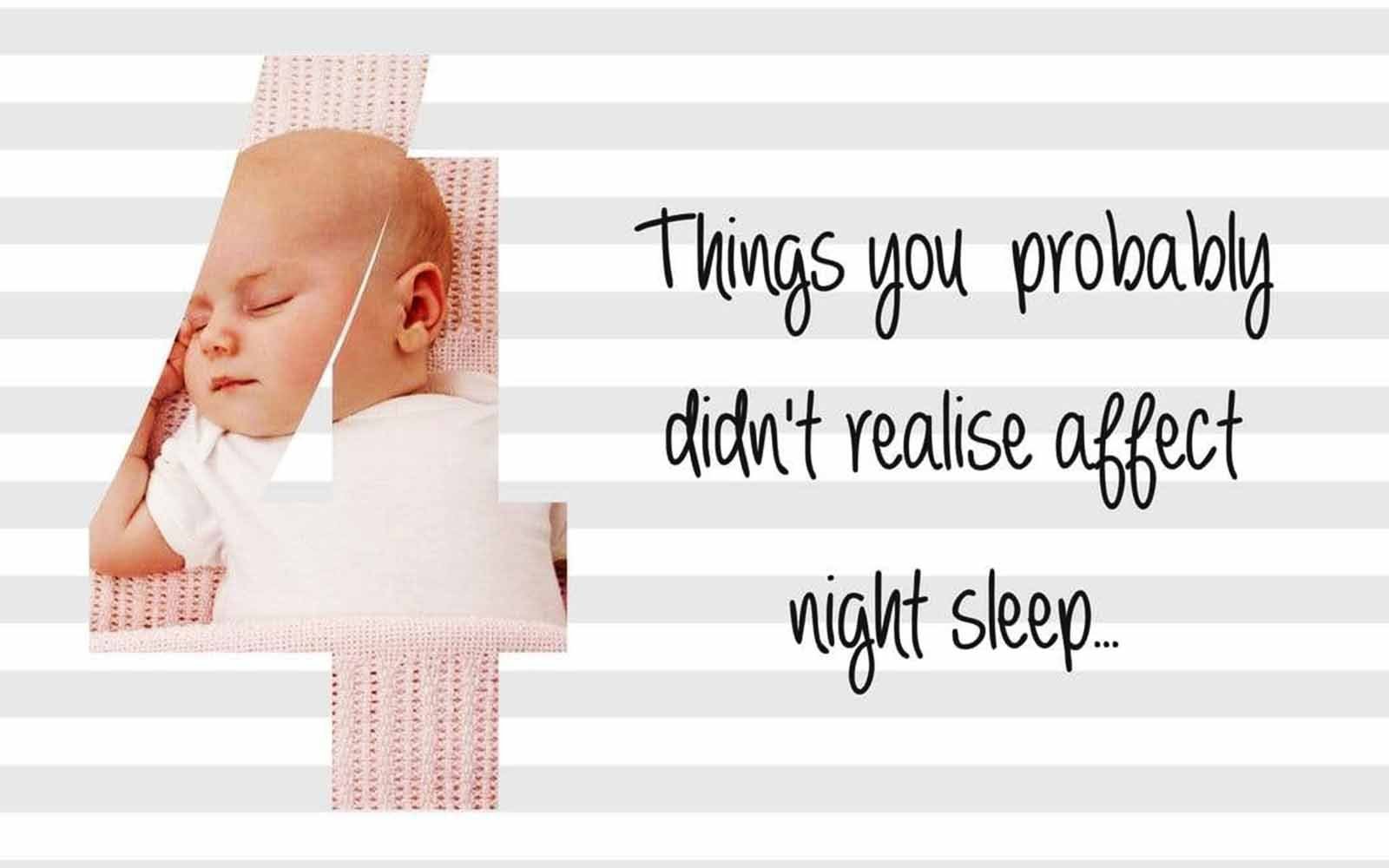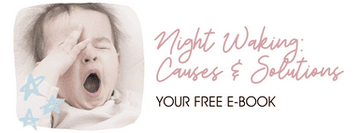
4 things you probably didn't realise affect night sleep!
A decent night sleep is the absolute parenting pinnacle isn't it?! But, we all know how darn hard that is to achieve.
Now, we're not talking about sleep training your baby or having unrealistic expectations of your newborn sleeping through the night. In this article, we want to share with you four quite unexpected and relatively unknown factors that might be inhibiting your baby or toddler sleeping better overnight:
- Starting solids
- Nightlights
- The late afternoon nap
- New skills and developmental leaps
You CAN have a better night’s sleep!
Whatever your current sleep situation, we've got the tools, the information and the personalised support to help you and your little one reclaim those nights.
Learn More
Starting solids
There is a bit of a myth that giving your baby solids will definitely help them sleep better at night. Yep, it can, in the long run, but certainly not initially. And "solids" is a very vague term - we need to be looking at what foods and at what times your little one is having that food, if we're discussing how solids helps night sleep.
Rushing in and giving your baby something "filling" like baby rice or a lamb chop close to bedtime is probably going to cause more trouble than do good overnight! When babies first start solids, their digestive system is completely unused to digesting anything other than milk. This means it's going to take a while for your wee one's body to get the hang of it.
At night, while we're lying down, our digestive system can also be a bit slower, therefore your baby will struggle more to digest solid food overnight than they will in the day. This in itself can be a cause of sudden night waking.
We suggest starting solids with your little one during the day, ideally at lunchtime. This means they have the whole rest of the day of being mobile and upright to aid digestion before lying down all night. And start small too. Go easy on quantity and let your baby's body get used to the solids intake bit by bit.
Furthermore, protein can be harder for some babies to digest than fruit and vegetables. So we always recommend protein is given at the lunchtime meal until your little one is a bit older - closer to 10 months of age. For babies just starting out on solids, give starchy vegetables or carbohydrates at dinnertime instead of protein.
So if your baby has recently started solids and their night sleep seems worse, take a look at the amount, types and timings of those solids.
If you're unsure about what foods are best for your little one, our Little Ones App is jam packed full of evidence-based nutritional information, meal guides and recipes.
Nightlights
Nightlights are really unnecessary for babies and younger toddlers. The purpose of a nightlight is to ease a fear of the dark... but, until toddlers develop imagination, they actually don't understand the concept of conscious fear. Babies definitely do not fear the dark; their imagination simply isn't developed enough.
At this age, all nightlights do is give your little one something distracting or stimulating to look at, making it harder for them to fall asleep. A lot of nightlights are also the "wrong" colour for promoting good sleep and actually inhibit the natural release of the sleep hormone melatonin, meaning your baby or toddler will struggle to settle into a deep sleep or into their night-time sleep cycles.
We'd generally suggest saving the nightlight until your child is over 2 and starts talking about a fear of the dark or asking about monsters in their room.
The late afternoon nap
Naps are definitely important for decent night sleep and we've written a lot about how too much or too little daytime sleep can adversely affect the night. One nap that does really sabotage the chances of a good night though, is the late afternoon nap. Ideally by 8 months this nap is gone altogether, because a nap that is too late in the day or for too long is going to wreak havoc with the night.
Once over 3 months old, any large chunk of sleep beyond 3PM can cause difficulties settling at bedtime. It can also cause night wakes, where your baby may be difficult to get back to sleep, and it can be the cause of an early morning wake. The late afternoon nap has a lot to answer for!
What we suggest is trying to get a longer sleep happening earlier in the day, around lunchtime, and using the late afternoon nap as a short catch-up nap to get your baby through until bedtime. It definitely shouldn't be their longest nap of the day.
New skills and developmental leaps
Big leaps in development, physical and mental, will mess with your child's sleep throughout the first 2 years of their life.
This is more noticeable around 8 months of age (read more about sleep regressions here) where your baby suddenly has a spurt of physical development and their naps and night sleep take a hit. At this age, your baby will be learning a whole lot of new skills: they'll be sitting, learning to crawl, possibly pulling to stand. Their brain is running at a million miles an hour and their sleep suffers as a result.
Say goodbye to sleepless nights.
Join over 500,000 families worldwide who are enjoying excellent sleep with our Sleep Programs, created by experts in the field of pediatric sleep.
Buy Now
It happens again around 12 months when your little one learns to walk and it will occur on and off whenever a new skill is being mastered - running, talking, climbing, socialising. These "regressions", thankfully, are temporary and should only last a few days to a week.
The key is to keep doing what you're doing during this time, stick to the routine in other words, and let your baby work through the changes. It is during sleep hiccups like this that many parents revert to rocking or patting their babies back to sleep and end up reintroducing sleep habits that will be harder to break now that their baby is older.
There are of course a dozen other factors influencing night-time sleep for babies and toddlers, but these four we've just mentioned are definitely the lesser known ones. If you'd like further information on achieving good night sleep, read this article.
If you'd like a helping hand to get your baby sleeping better overnight, make sure to check out our Little Ones App. Get instant access to our trusted sleep solutions, including age-appropriate, daily sleep and feed schedules, troubleshooting notes for when things don't go to plan, gentle settling methods and more!
___________
Bibliography
Atun-Einy, O., & Scher, A. (2016). Sleep disruption and motor development: Does pulling-to-stand impacts sleep–wake regulation? Infant Behavior and Development, 42, 36–44. https://doi.org/10.1016/j.infbeh.2015.11.003
Dewar, G. (2014, January 2). Baby sleep requirements: How much sleep do babies really need? PARENTING SCIENCE. http://parentingscience.com/baby-sleep-requirements/
Dewar, G. (2020, July 17). Baby sleep deprivation: How to tell if your baby isn’t sleeping enough. PARENTING SCIENCE. http://parentingscience.com/baby-sleep-deprivation/
St James-Roberts, I., Roberts, M., Hovish, K., & Owen, C. (2015). Video Evidence That London Infants Can Resettle Themselves Back to Sleep After Waking in the Night, as well as Sleep for Long Periods, by 3 Months of Age. Journal of Developmental & Behavioral Pediatrics, 36(5), 324–329. https://doi.org/10.1097/dbp.0000000000000166
Tham, E., Schneider, N., & Broekman, B. (2017). Infant sleep and its relation with cognition and growth: a narrative review. Nature and Science of Sleep, Volume 9, 135–149. https://doi.org/10.2147/nss.s125992

Receive product and services updates, promotional offers and other marketing communications based.





